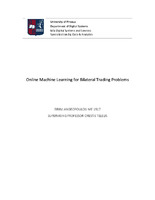| dc.contributor.advisor | Τελέλης, Ορέστης | |
| dc.contributor.advisor | Telelis, Orestis | |
| dc.contributor.author | Αγγελοπούλου, Ειρήνη | |
| dc.contributor.author | Angelopoulou, Eirini | |
| dc.date.accessioned | 2022-03-16T07:18:50Z | |
| dc.date.available | 2022-03-16T07:18:50Z | |
| dc.date.issued | 2022 | |
| dc.identifier.uri | https://dione.lib.unipi.gr/xmlui/handle/unipi/14225 | |
| dc.identifier.uri | http://dx.doi.org/10.26267/unipi_dione/1648 | |
| dc.description.abstract | Στα πλαίσια της παρούσας διπλωματικής εργασίας, θα ασχοληθούμε με την θεματική
του «Online Learning» και τις εφαρμογές του στις «online» δημοπρασίες με διαμελάβηση. Στις
μέρες μας όλες οι συναλλαγές, στις σύγχρονες ηλεκτρονικές πλατφόρμες, πραγματοποιούνται
αποκλειστικά μέσω «online» δημοπρασιών σε πραγματικό χρόνο. Ο σχεδιασμός τέτοιων
δημοπρασιών αλλά και η ανάλυση των ιδιοτήτων τους έχουν δώσει κίνητρο για διεξαγωγή
μεγάλου όγκου ερευνών τα τελευταία χρόνια. Εστιάζοντας κυρίως στον σχεδιασμό της βέλτιστης
δημοπρασίας με στόχο την μεγιστοποίηση των εσόδων του πωλητή.
Συγκεκριμένα, ερευνούμε βιβλιογραφικά το πρόβλημα του «Online Learning» και
παρουσιάζουμε κάποιες βασικές ιδέες και μεθόδους. Ξεκινώντας με την κατηγορία
προβλημάτων «Πλήρους Πληροφορίας» με «Συμβουλή ειδικού», και «Μερικής Πληροφορίας»
προβλήματα με «Κουλοχέρηδες». Με σκοπό στην συνέχεια να εμβαθύνουμε στις «online»
δημοπρασίες και τις δίπλες δημοπρασίες, τις οποίες θα χρησιμοποιήσουμε παρακάτω και στο
πειραματικό κομμάτι της εργασίας.
Αναλυτικά, για το πειραματικό σκέλος εξετάζουμε τους αλγόριθμους που παρουσιάσαμε
στην ενότητα του «Online Learning». Αρχικά επιλέγουμε τρεις «Πλήρους Πληροφορίας»
αλγορίθμους, τον «Follow the Best Price» αλγόριθμο, μια τροποποιημένη εκδοχή του πρώτου
την οποία αναφέρουμε ως «Follow the Best Price with Greedy sampling», και τον «Exponential
Weighted Average» αλγόριθμο. Και στην συνέχεια επιλέγουμε τον «ε-Greedy» αλγόριθμο από
τις «Μερικής Πληροφορίας» μεθόδους.
Πραγματοποιούμε πειράματα με την χρήση των προαναφερθέντων αλγορίθμων, σε
τέσσερα διαφορετικά σύνολα τιμών αγοραστών και πωλητών. Παρατηρούμε ότι σχεδόν όλοι οι
αλγόριθμοι που εξετάσαμε πέτυχαν μικρά (λογαριθμικά) «Regret». Συγκρίνοντας τους
αλγορίθμους μεταξύ τους, ο «Follow the Best Price» αλγόριθμος είναι ο αλγόριθμος με την
καλύτερη απόδοση για τα περισσότερα σύνολα και ο «ε-Greedy» ο αλγόριθμος με την χειρότερη.
Και τέλος, ο τροποποιημένος αλγόριθμος «Follow the Best Price with Greedy sampling»,
ξεπερνάει σε αποτελέσματα τον αρχικό «Follow the Best Price» σε μόνο ένα από τα σύνολα που
εξετάστηκαν. | el |
| dc.format.extent | 56 | el |
| dc.language.iso | en | el |
| dc.publisher | Πανεπιστήμιο Πειραιώς | el |
| dc.rights | Αναφορά Δημιουργού-Μη Εμπορική Χρήση-Όχι Παράγωγα Έργα 3.0 Ελλάδα | * |
| dc.rights.uri | http://creativecommons.org/licenses/by-nc-nd/3.0/gr/ | * |
| dc.title | Online machine learning for bilateral trading problems | el |
| dc.title.alternative | Άμεση μηχανική μάθηση για προβλήματα διμερών συναλλαγών | el |
| dc.type | Master Thesis | el |
| dc.contributor.department | Σχολή Τεχνολογιών Πληροφορικής και Επικοινωνιών. Τμήμα Ψηφιακών Συστημάτων | el |
| dc.description.abstractEN | In this work, we are studying Online Learning and its application in Online Auctions
through intermediation. These days, all transactions on modern platforms are conducted
exclusively through real-time online auctions. The design of such auctions and their properties
have initiated a lot of research in the past years, focusing on designing the optimal auction
mechanism to maximize the seller’s revenue.
Specifically, throughout this study, we explore bibliographically the Online Learning and
its key ideas and methods. We begin with the Full Feedback and the Expert Advice methods,
followed by the Partial Feedback and the Bandit general setting. Afterwards we continue our
investigation with the problem of Online Auctions and the Double Auction or Bilateral Trade
setting, which we will also examine in the experimental section too.
For the experiment, we explore the algorithms we presented in the section on Online
Learning. Initially, we selected three Full-feedback algorithms, the Follow the Best
Price algorithm, a modified Follow the Best Price with Greedy sampling, and the Exponential
Weighted Average algorithm. We then continued the analysis with an ε-Greedy algorithm from
the Partial-feedback category of algorithms.
We compare the performance of the above algorithms in the Bilateral Trade setup,
selecting four different sets for the sellers’ and the buyers’ prices. All the algorithms tested
achieved small (logarithmic) regret and generally the findings verify the theoretical results.
Comparing the results of the algorithms, the Follow the best price algorithm is the best
performing algorithm for most of the sets while the ε-Greedy algorithm is the worst. Our
modified Follow the Best Price with Greedy sample algorithm achieved the best results, actually
outperforming the original Follow the Best Price algorithm, in one of the four experiments. | el |
| dc.contributor.master | Προηγμένα Συστήματα Πληροφορικής | el |
| dc.subject.keyword | Online learning | el |
| dc.subject.keyword | Online auctions | el |
| dc.subject.keyword | Machine learning | el |
| dc.subject.keyword | Predicting from expert advice | el |
| dc.subject.keyword | Multiarmed bandit problem | el |
| dc.date.defense | 2022-02-28 | |



